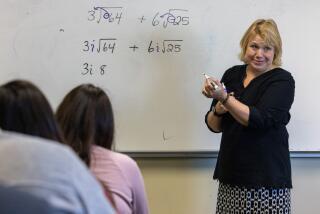Teaching Algebra to All
- Share via
Re “No Algebra, No Graduation,” Oct. 6: I spent 28 years of my life teaching physics, math and assorted science courses on both the high school and college level. The algebra I taught was necessary for my students to pass my physics courses; however, I always wondered of what use is algebra to the students who do not go on to take the next level of chemistry, electronics or physics. Reading the Algebra I sample problems in the article I wondered of what use is the ability to simplify b raised to the minus-5 power to the plumber, carpenter, salesperson, mail carrier or even a pilot, doctor or lawyer.
I contend that much of the practical application of algebra (if indeed ever needed in adult life) is now obsolete because of the power of hand-held calculators. Shouldn’t a math curriculum at least include proficiency with calculators, especially the application of memory functions? I would love to teach a course called “Algebra With a Calculator,” but alas, I retired from teaching and am now a businessman. But how about teaching the math we really need? Yes, I’m talking about business math. I never learned it in school. I learned it the hard way. Knowing all the algebra I ever taught never helped in my business. Do we not shortchange our students by not teaching them something about mortgage interest, percentage markups, income tax, life insurance, balancing your checkbook, household budgets, investments and even the danger of scams? Can’t we rethink the skills our students really need in life?
Saylor S. Milton
Ventura
*
If educators were serious about making sure high school students gained success in learning algebra, they would make sure that fractions instruction (e.g., 3/4 times 5/6) was delayed until it was clear higher- order mathematics demanded that comprehension of fractions knowledge was essential to its successive attainment.
As it now stands, very little about fractions that is taught in elementary schools is retained year-by-year by younger students. This suggests that whatever fractions knowledge is needed by students to learn advanced mathematics would best be developed in advanced-level mathematics courses. The only reason I could discover why elementary school mathematics curricula do not adopt this rational approach to teaching fractions is the weight of tradition.
Patrick Groff
Professor of Education Emeritus, San Diego
More to Read
Sign up for Essential California
The most important California stories and recommendations in your inbox every morning.
You may occasionally receive promotional content from the Los Angeles Times.













